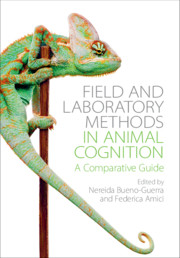
-
Select format
-
- Publisher:
- Cambridge University Press
- Publication date:
- July 2018
- August 2018
- ISBN:
- 9781108333191
- 9781108420327
- 9781108413947
- Dimensions:
- (247 x 174 mm)
- Weight & Pages:
- 1.06kg, 456 Pages
- Dimensions:
- (247 x 174 mm)
- Weight & Pages:
- 0.92kg, 456 Pages
- Subjects:
- Animal Behaviour, Life Sciences, Evolutionary Biology
You may already have access via personal or institutional login- Subjects:
- Animal Behaviour, Life Sciences, Evolutionary Biology
Book description
Would you ask a honeybee to point at a screen and recognise a facial expression? Or ask an elephant to climb a tree? While humans and non-human species may inhabit the same world, it's likely that our perceptual worlds differ significantly. Emphasising Uexküll's concept of 'umwelt', this volume offers practical advice on how animal cognition can be successfully tested while avoiding anthropomorphic conclusions. The chapters describe the capabilities of a range of animals - from ants, to lizards to chimpanzees - revealing how to successfully investigate animal cognition across a variety of taxa. The book features contributions from leading cognition researchers, each offering a series of examples and practical tips drawn from their own experience. Together, the authors synthesise information on current field and laboratory methods, providing researchers and graduate students with methodological advice on how to formulate research questions, design experiments and adapt studies to different taxa.
Reviews
‘Field and Laboratory Methods in Animal Cognition, edited by Bueno-Guerra and Amici, manages also to implicitly teach some of the fundamentals of cognition in the way it showcases methods. By illuminating how similar cognitive principles need to be tested differently across species, the existence of the volume itself proves the importance of the 'Umwelt' concept it champions. With a star-studded lineup of authors, the book serves as a snapshot of who is doing what and how in the field of comparative cognition.’
Alison L. Greggor Source: The Quarterly Review of Biology
Contents
Metrics
Full text views
Full text views help Loading metrics...
Loading metrics...
* Views captured on Cambridge Core between #date#. This data will be updated every 24 hours.
Usage data cannot currently be displayed.
Accessibility standard: Unknown
Why this information is here
This section outlines the accessibility features of this content - including support for screen readers, full keyboard navigation and high-contrast display options. This may not be relevant for you.
Accessibility Information
Accessibility compliance for the PDF of this book is currently unknown and may be updated in the future.


